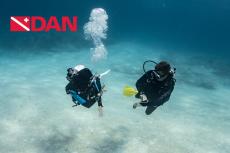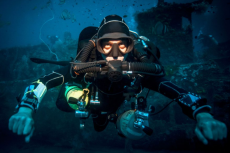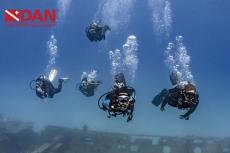Divers Adrift - Surviving Being Lost at Sea
Exploration isn’t easy — if it were, everyone would do it. The reality is that the next big shipwreck to be found may be hundreds of miles from the nearest coast, tucked into a remote cove hours from civilization or in an area with huge tidal currents.
The more difficult a wreck is to get to, the more rewarding its discovery, but also the more likely it is that you’ll run into trouble during or after your dive. Challenges become hazards quickly, and many offshore adventures are rife with risk factors that make it more likely that you’ll surface from your dive without a boat in sight.
Whether your charter sprung a leak and became a new dive site or drifted off in search of another diver here’s what you need to know to survive.
Assess Your Situation
The first step in any survival situation is to take in all the information available to you. Were you live-boating and might a vessel be coming to pick you up, or did you drift away from an anchored vessel by accident?
If you are lost without the knowledge that a vessel is actively looking for you it may be wise to start thinking about nearby shore. With near-coastal charters in particular, land may be just a short swim away. Extended exposure to the elements means dehydration, loss of body heat, exposure to sun and lack of food and water.
You’ll want to look at what you have for signaling devices and exposure protection first; your most important task is to signal a vessel, but you’ll need to avoid becoming too sunburned or cold in the process. Should your attempts to signal a passing vessel fail you’ll want to ensure you’re as warm and uninjured as possible while you wait for a search party to locate you.
Keep Calm and Float On
Keeping a cool head may be the most important thing to do in any emergency situation. Once you’ve assessed your situation and discovered that you are actually lost at sea it’s critical that you take a deep breath and force yourself to think as clearly and rationally as possible.
It’s a common occurrence in some areas to be out of sight of a dive vessel at times, particularly in areas like Northern Ireland where diving in tall seas is common. It may be the case that the crew has a careful eye on you from a higher vantage point (the view from a tall wheelhouse is much better than that of a diver floating on the surface), or they may have gone after another lost diver but still know your location.
At night a vessel may run with minimal lights to preserve the crew’s night vision, and you may have to look for red and green side markers to spot them. In case you have been lost by your vessel, panic can quickly make your situation dangerous. Take a deep breath, locate and grab hold of your buddy, make yourself positively buoyant and as comfortable as possible, and prepare for your next step.
Hope for the Best; Prepare for the Worst
If it’s apparent that help will not arrive very soon, it’s time to begin planning for the worst-case scenario. Ditch your weights and extraneous gear (if you haven’t already), inflate your BCD and lie back on it to keep yourself out of the water as much as possible. Tie your BCD to your buddy’s with a piece of line from a reel or a clip — positive outcomes in survival situations are more likely in groups.
Stay close together for warmth and to help each other deal with any issues that arise. You’ll be able to survive for about three days without water and three weeks without food. Depending on when and where you’ve been stranded exposure protection will most likely be your first concern.
Keep your exposure suit of choice on, minimize unnecessary movement, and pull your legs toward your torso and hug them to minimize heat loss. You can find some protection from the sun by holding up a fin, a piece of a wetsuit or some other light piece of gear. It’s unlikely that you’ll be able to source water or food while floating, so focus on staying warm and close to your buddy.
For more information about survival at sea, visit: DAN.org




































































































